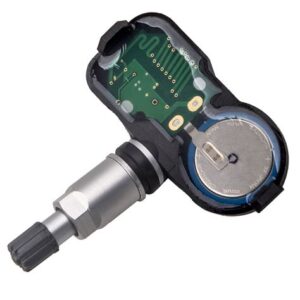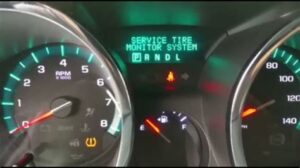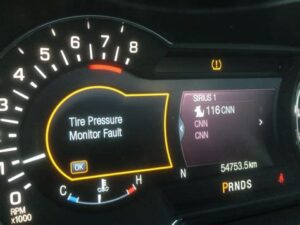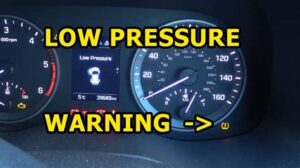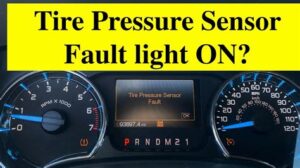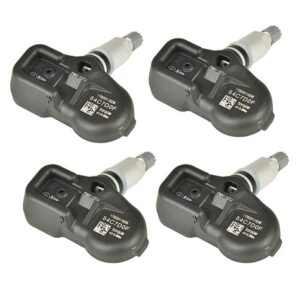Explore tire pressure sensors, their maintenance, Costco services, cost-benefit analysis, and tips for DIY vs. professional replacements for optimal vehicle safety.Maintaining optimal tire performance is crucial for both safety and efficiency, making tire pressure sensors an integral part of modern vehicles. These sensors not only monitor tire pressure but also alert drivers to potential issues that could compromise safety. However, like all components, tire pressure sensors require regular replacement to ensure they function effectively. In this blog post, we’ll explore the ins and outs of tire pressure sensors, discussing their importance and the benefits of regular sensor replacement. We’ll also delve into the services offered by Costco, comparing the costs and benefits of replacement options, and weigh the pros and cons of taking a DIY approach versus seeking professional help. Whether you’re a seasoned car enthusiast or a casual driver, understanding tire pressure sensor maintenance can make a significant difference in your driving experience.
Understanding Tire Pressure Sensors
Tire pressure sensors play a critical role in maintaining vehicle safety and performance. These sensors monitor the air pressure inside your tires and alert drivers when the pressure falls below the recommended level. Understanding how these sensors work and their importance can help you ensure your vehicle operates safely and efficiently.
How Tire Pressure Sensors Work
Tire pressure monitoring systems (TPMS) come in two primary forms: direct TPMS and indirect TPMS.
- Direct TPMS: These sensors are mounted inside each tire, directly measuring the air pressure. They transmit data to the vehicle’s onboard computer, which provides real-time tire pressure readings.
- Indirect TPMS: Indirect systems do not use dedicated sensors in each tire. Instead, they utilize the vehicle’s anti-lock braking system (ABS) sensors to measure the rotation speed of the tires. If a tire is under-inflated, it will have a different rotational speed, signaling that the pressure is low.
Importance of Tire Pressure Sensors
Maintaining the proper tire pressure is crucial for several reasons:
- Safety: Under-inflated tires can lead to blowouts and loss of vehicle control.
- Fuel Efficiency: Properly inflated tires improve fuel economy. Under-inflated tires increase rolling resistance, leading to higher fuel consumption.
- Tire Longevity: Maintaining optimal tire pressure can help extend the lifespan of your tires by preventing uneven wear.
Signs of Malfunctioning Tire Pressure Sensors
If your vehicle’s TPMS warning light illuminates, or if you notice inconsistent tire pressure readings, it may indicate that your sensors are not functioning properly. Regular checks and calibration are necessary to ensure their accuracy.
Regular Maintenance
To keep your tire pressure sensors in good working condition, it’s essential to incorporate them into your routine vehicle maintenance. Regularly check your tire pressure, and ensure that your tire sensors are inspected during scheduled service visits.
In summary, having a clear understanding of tire pressure sensors helps you appreciate their role in vehicle maintenance and safety. By staying informed and monitoring your tire pressure, you can avoid potential accidents and enhance the performance of your vehicle.
Importance of Regular Sensor Replacement
Regular replacement of tire pressure sensors is crucial for maintaining optimal driving safety and performance. These sensors play a vital role in monitoring tire pressure, which can significantly impact fuel efficiency, tire wear, and overall vehicle handling. Here are a few key reasons why regular sensor replacement should be on your maintenance checklist:
- Safety: Accurate tire pressure readings help prevent blowouts and skids, ensuring a safer driving experience.
- Fuel Efficiency: Properly inflated tires enhance fuel efficiency. Under-inflated tires can cause the engine to work harder, leading to increased fuel consumption.
- Tire Longevity: Regular replacement of malfunctioning sensors helps avoid uneven tire wear, extending the lifespan of your tires.
- Compliance: Some regions have strict regulations regarding vehicle safety and maintenance. Keeping your tire pressure sensors in good working order ensures compliance with these regulations.
When it comes to maintaining your vehicle, ignoring the state of your tire pressure sensors can lead to more significant issues down the road. Frequently replacing and calibrating these sensors not only enhances your vehicle’s performance but also contributes to a sustainable driving experience.
A well-maintained vehicle is a safe vehicle.
– Auto Maintenance Expert
In summary, prioritizing the regular replacement of tire pressure sensors is essential for anyone looking to maximize vehicle safety, performance, and cost-efficiency.
Costco’s Tire Pressure Sensor Services
When it comes to maintaining your vehicle’s health, tire pressure sensors play a crucial role. At Costco, we understand the importance of these sensors in ensuring optimal tire performance and safety on the road. Here’s an overview of the services we offer for tire pressure sensor replacement and why you should consider them.
What Are Tire Pressure Sensors?
Tire pressure sensors monitor the air pressure inside your tires and alert you when it falls below recommended levels. This helps prevent tire blowouts and enhances fuel efficiency. Regular maintenance is essential, and that includes timely replacements.
Costco’s Tire Pressure Sensor Replacement Services
- Professional Assessment: Our trained technicians perform a thorough inspection of your tire pressure sensors to determine if a replacement is needed.
- Quality Parts: At Costco, we ensure that only high-quality, compatible sensors are used during replacement, offering you peace of mind.
- Convenience: With multiple locations, getting your tire pressure sensors replaced at Costco is hassle-free. You can schedule an appointment that fits your busy life.
- Expert Guidance: Our staff is always on hand to provide advice on maintaining your sensors and other tire-related services.
Benefits of Using Costco for Tire Pressure Sensor Replacement
Choosing Costco for your tire pressure sensor needs comes with numerous advantages:
- Competitive Prices: We offer affordable rates for tire pressure sensor replacements, ensuring you receive excellent value for your investment.
- Membership Perks: As a Costco member, enjoy additional savings and exclusive offers on tire services, making it cost-effective.
- Comprehensive Services: Alongside tire pressure sensor replacements, you can take advantage of our other tire services, such as rotations and alignments, all under one roof.
Customer Satisfaction
At Costco, customer satisfaction is our priority. Many of our members have shared positive experiences related to our tire pressure sensor replacement services, praising our efficiency and professionalism. Here’s what some have to say:
“The service was quick, and the staff was extremely knowledgeable. I feel much safer knowing my tire sensors have been replaced!”
– A happy Costco member
Get Started Today!
If your vehicle is due for a tire pressure sensor check or replacement, head over to your local Costco today. Keeping your tires in optimal condition has never been easier.
Your safety is our priority, and with our comprehensive tire pressure sensor services, you can drive with confidence!
Cost vs. Benefit of Sensor Replacement
When it comes to maintaining your vehicle, one of the vital components often overlooked is the tire pressure sensor. Understanding the cost versus the benefit of replacing these crucial sensors can significantly impact your vehicle’s safety and performance.
Understanding the Costs
The cost of tire pressure sensor replacement can vary based on several factors, including:
- Type of vehicle
- Make and model of the sensor
- Labor costs at your local auto repair shop or retailer
On average, replacing a single tire pressure sensor can range from $50 to $125, including parts and labor. If you’re replacing all four sensors, the total cost can climb to around $200 to $500.
Evaluating the Benefits
The benefits of replacing faulty tire pressure sensors extend beyond just the financial aspect:
- Improved Safety: Proper tire pressure is crucial for safe driving. Under-inflated tires can lead to blowouts and decreased traction, especially in adverse conditions.
- Increased Fuel Efficiency: Maintaining the correct tire pressure enhances fuel efficiency by reducing rolling resistance, potentially saving you money at the gas pump.
- Extended Tire Life: Regular sensor replacement helps ensure your tires are properly inflated, which can prolong their lifespan.
- Enhanced Vehicle Performance: Properly inflated tires result in optimal handling and performance, making your driving experience smoother and more enjoyable.
Cost-Benefit Analysis
When considering the cost of replacement versus the benefits of enhanced safety and performance, it becomes a no-brainer for most vehicle owners. The initial financial outlay is far outweighed by the long-term gains associated with regular maintenance of tire pressure sensors.
Ultimately, investing in the replacement of your tire pressure sensors is not only about compliance but is also a proactive measure to ensure the overall safety and efficiency of your vehicle. The benefits clearly demonstrate that proper maintenance and sensor replacement should not be neglected.
DIY vs. Professional Sensor Replacement
When it comes to replacing tire pressure sensors, car owners often face a choice between two main approaches: DIY (Do It Yourself) or hiring a professional service. Both options have their merits, but understanding the differences can help you make an informed decision that suits your needs.
DIY Sensor Replacement
Opting for a DIY tire pressure sensor replacement can be a rewarding endeavor, especially for those who enjoy hands-on projects. Here are some of the advantages:
- Cost-Effective: Performing the replacement yourself can save you money on labor costs charged by shops.
- Flexibility: You can choose the time that works best for you, without worrying about shop hours.
- Learning Opportunity: It allows you to gain valuable knowledge about your vehicle’s maintenance.
However, there are challenges:
- Tools Required: You may need specialized tools, such as a tire pressure monitoring system (TPMS) tool.
- Time-Consuming: The process can take longer if you’re not familiar with it.
- Risk of Errors: Incorrect installation could lead to malfunctions or safety concerns.
Professional Sensor Replacement
On the other hand, going for professional tire pressure sensor replacement provides several distinct benefits:
- Expertise: Professionals have training and experience, ensuring the job is done correctly.
- Time Efficiency: The process is generally quicker and can often be completed the same day.
- Guaranteed Quality: Many shops offer warranties on parts and labor, providing peace of mind.
Nevertheless, there are some downsides to consider:
- Higher Costs: Hiring professionals comes with labor costs that can add up.
- Scheduling: You may need to work around the shop’s schedule, which might not align with yours.
Making the Choice
Ultimately, choosing between DIY and professional sensor replacement depends on your personal preferences, skills, and resources. Here are a few considerations to help you decide:
| Criteria | DIY | Professional |
|---|---|---|
| Cost | Lower | Higher |
| Time | Variable | Less |
| Skill Level | Requires Knowledge | Expertise |
| Warranty | No | Often Included |
Take the time to assess your comfort level with vehicle maintenance. If you feel confident in your abilities and have the necessary tools, DIY replacement might be the way to go. Conversely, if you’re unsure, or want the peace of mind that comes with professional service, don’t hesitate to reach out to a qualified technician.
Frequently Asked Questions
What is a tire pressure sensor and why is it important?
A tire pressure sensor monitors the air pressure inside the tires and alerts the driver if the pressure is too low. Maintaining correct tire pressure is crucial for safety, fuel efficiency, and tire longevity.
How do I know if my Costco tire pressure sensor needs replacement?
Signs that your tire pressure sensor may need replacement include frequent warning lights on the dashboard, incorrect pressure readings, or if the sensor is damaged during a tire change.
Can I replace the tire pressure sensors myself?
While it’s technically possible to replace tire pressure sensors yourself, it requires specific tools and knowledge. If you’re not comfortable with this, it’s best to have a professional handle the replacement.
How much does it cost to replace tire pressure sensors at Costco?
The cost to replace tire pressure sensors at Costco can vary, but it typically ranges from $30 to $100 per sensor, depending on the type and model of your vehicle.
Does Costco offer a warranty on tire pressure sensor replacements?
Yes, Costco generally offers a warranty on tire pressure sensor replacements. It’s best to check with your local Costco for specific terms and conditions.
What happens if I don’t replace a faulty tire pressure sensor?
If you don’t replace a faulty tire pressure sensor, you may experience poor tire performance, increased risk of tire blowouts, and reduced fuel efficiency, as you won’t be alerted to improper tire pressure.
How often should tire pressure sensors be replaced?
Tire pressure sensors typically last for around 5-10 years, but it’s essential to check them regularly for functionality, especially during tire changes or routine maintenance.
